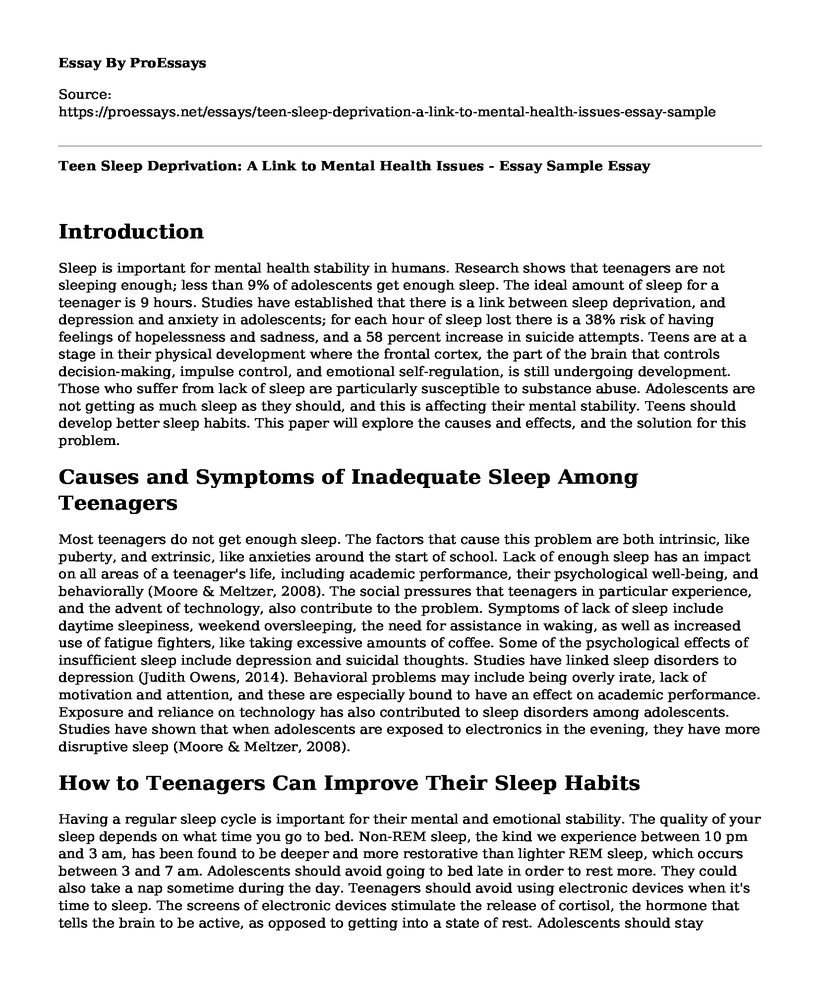Introduction
Sleep is important for mental health stability in humans. Research shows that teenagers are not sleeping enough; less than 9% of adolescents get enough sleep. The ideal amount of sleep for a teenager is 9 hours. Studies have established that there is a link between sleep deprivation, and depression and anxiety in adolescents; for each hour of sleep lost there is a 38% risk of having feelings of hopelessness and sadness, and a 58 percent increase in suicide attempts. Teens are at a stage in their physical development where the frontal cortex, the part of the brain that controls decision-making, impulse control, and emotional self-regulation, is still undergoing development. Those who suffer from lack of sleep are particularly susceptible to substance abuse. Adolescents are not getting as much sleep as they should, and this is affecting their mental stability. Teens should develop better sleep habits. This paper will explore the causes and effects, and the solution for this problem.
Causes and Symptoms of Inadequate Sleep Among Teenagers
Most teenagers do not get enough sleep. The factors that cause this problem are both intrinsic, like puberty, and extrinsic, like anxieties around the start of school. Lack of enough sleep has an impact on all areas of a teenager's life, including academic performance, their psychological well-being, and behaviorally (Moore & Meltzer, 2008). The social pressures that teenagers in particular experience, and the advent of technology, also contribute to the problem. Symptoms of lack of sleep include daytime sleepiness, weekend oversleeping, the need for assistance in waking, as well as increased use of fatigue fighters, like taking excessive amounts of coffee. Some of the psychological effects of insufficient sleep include depression and suicidal thoughts. Studies have linked sleep disorders to depression (Judith Owens, 2014). Behavioral problems may include being overly irate, lack of motivation and attention, and these are especially bound to have an effect on academic performance. Exposure and reliance on technology has also contributed to sleep disorders among adolescents. Studies have shown that when adolescents are exposed to electronics in the evening, they have more disruptive sleep (Moore & Meltzer, 2008).
How to Teenagers Can Improve Their Sleep Habits
Having a regular sleep cycle is important for their mental and emotional stability. The quality of your sleep depends on what time you go to bed. Non-REM sleep, the kind we experience between 10 pm and 3 am, has been found to be deeper and more restorative than lighter REM sleep, which occurs between 3 and 7 am. Adolescents should avoid going to bed late in order to rest more. They could also take a nap sometime during the day. Teenagers should avoid using electronic devices when it's time to sleep. The screens of electronic devices stimulate the release of cortisol, the hormone that tells the brain to be active, as opposed to getting into a state of rest. Adolescents should stay physically, either by participating in a sport at school, or having a fitness schedule. People who exercise generally sleep better than those who don't. Avoid taking sugar at night. Body sugar drops and the body releases adrenaline, waking us up at night and disrupting sleep. Meditation is also known to help calm the mind for deeper, more restful sleep. Adolescents should develop better sleep habits. It will help them maintain good mental and psychological state, as well as help them concentrate at school.
References
Judith Owens. (2014). Insufficient Sleep in Adolescents and Young Adults: An Update on Causes and Consequences (p. 926). Illinois: American Academy of Pediatrics. Retrieved from https://pediatrics.aappublications.org/content/134/3/e921
Moore, M., & Meltzer, L. (2008). The sleepy adolescent: causes and consequences of sleepiness in teens. Paediatric Respiratory Reviews, 9(2), 114-121. https://doi.org/10.1016/j.prrv.2008.01.001
Richter, R. (2015). Among teens, sleep deprivation an epidemic. News Center. Retrieved 6 May 2020, from https://med.stanford.edu/news/all-news/2015/10/among-teens-sleep-deprivation-an-epidemic.html.
Cite this page
Teen Sleep Deprivation: A Link to Mental Health Issues - Essay Sample. (2023, Jul 05). Retrieved from https://proessays.net/essays/teen-sleep-deprivation-a-link-to-mental-health-issues-essay-sample
If you are the original author of this essay and no longer wish to have it published on the ProEssays website, please click below to request its removal:
- Effect of Cell Phone Use on People Essay
- Abortion: Ethical Theories and Principles Essay
- Essay Sample on the Challenges Facing Nurses Today
- Article Analysis Essay on Lifelong Learning Strategies in Nursing: A Systematic Review
- Essay on Visiting Hours in ICU: Limitations on Family Care and Life-Critical Decisions
- Don't Lose Hope: Lockdown Leads to Better Times Ahead - Essay Sample
- Paper Sample on TBE: Tick-Borne Encephalitis: Causes, Symptoms, and Treatment







